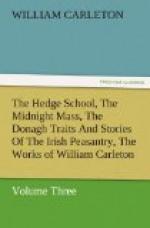The family of the Meehans consisted of their wives and three children, two boys and a girl; the former were the offspring of the younger brother, and the latter of Anthony. It has been observed, with truth and justice, that there is no man, how hardened and diabolical soever in his natural temper, who does not exhibit to some particular object a peculiar species of affection. Such a man was Anthony Meehan. That sullen hatred which he bore to human society, and that inherent depravity of heart which left the trail of vice and crime upon his footsteps, were flung off his character when he addressed his daughter Anne. To him her voice was like music; to her he was not the reckless villain, treacherous and cruel, which the helpless and unsuspecting found him; but a parent kind and indulgent as ever pressed an only and beloved daughter to his bosom. Anne was handsome: had she been born and educated in an elevated rank in society, she would have been softened by the polish and luxury of life into perfect beauty: she was, however, utterly without education. As Anne experienced from her father no unnatural cruelty, no harshness, nor even indifference, she consequently loved him in return; for she knew that tenderness from such a man was a proof of parental love rarely to be found in life. Perhaps she loved not her father the less on perceiving that he was proscribed by the world; a circumstance which might also have enhanced in his eyes the affection she bore him. When Meehan came to Carnmore, she was sixteen; and, as that was three years before the incident occurred on which we have founded this narrative, the reader may now suppose her to be about nineteen; an interesting country girl, as to person, but with a mind completely neglected, yet remarkable for an uncommon stock of good nature and credulity.




